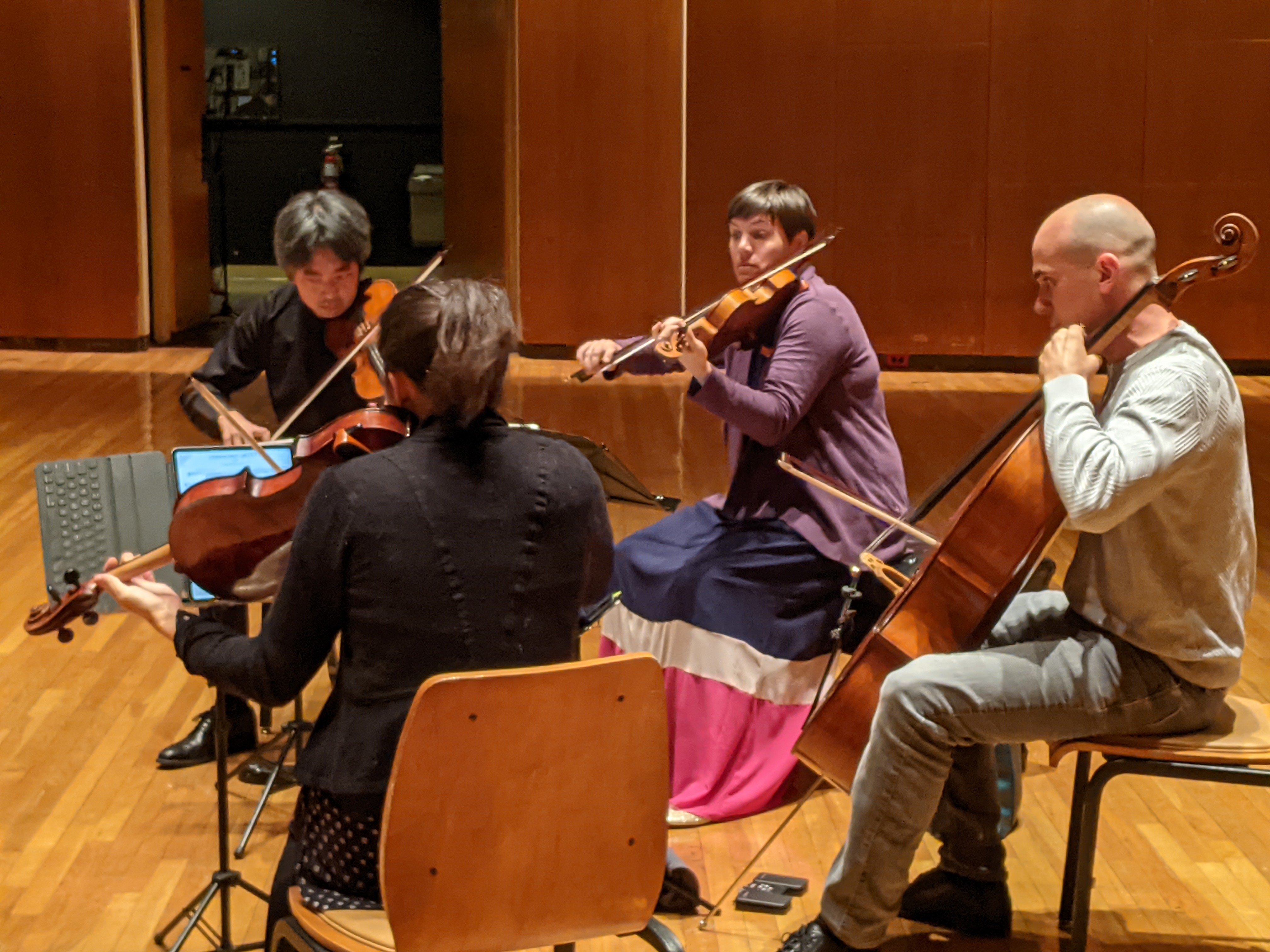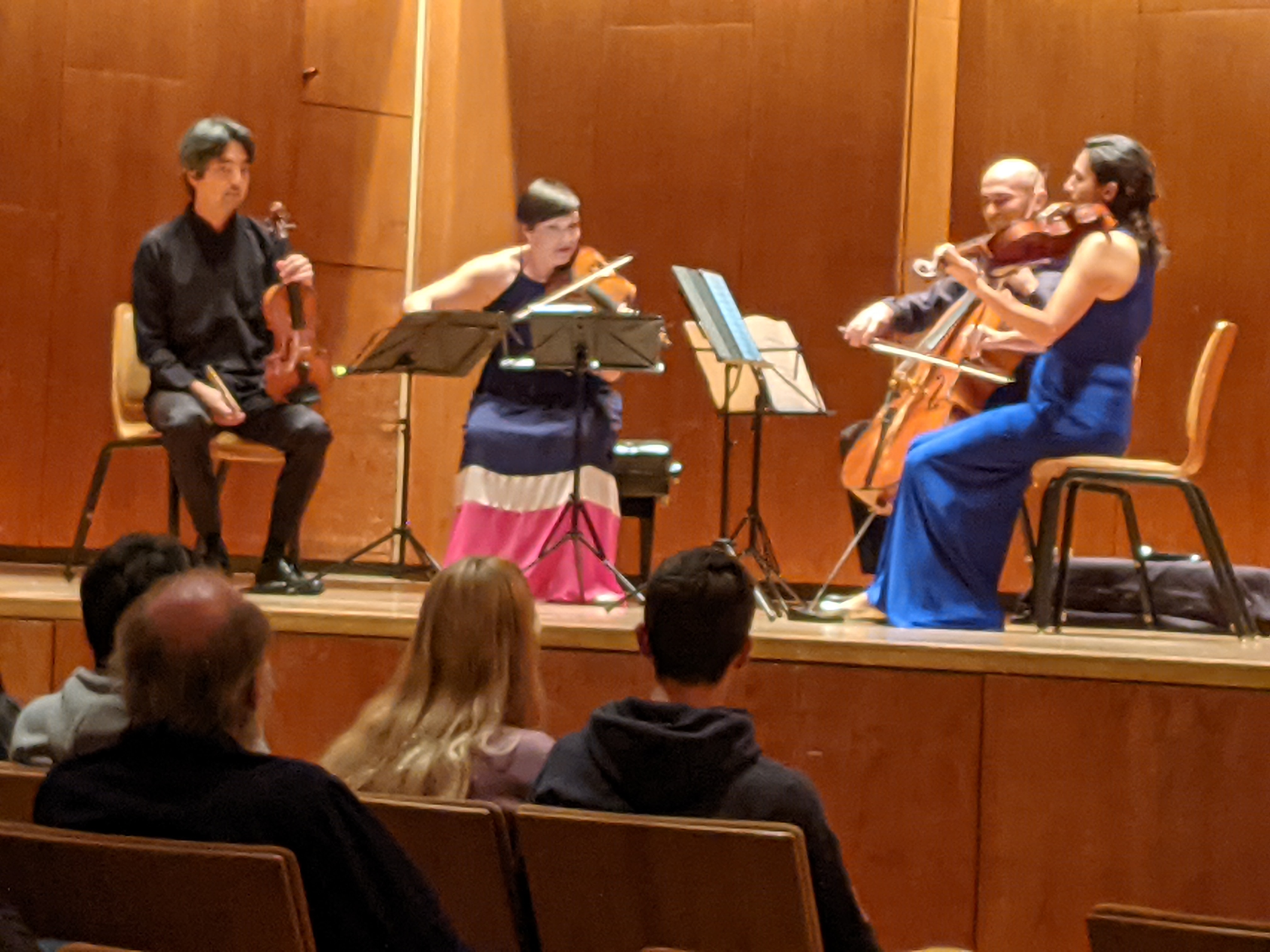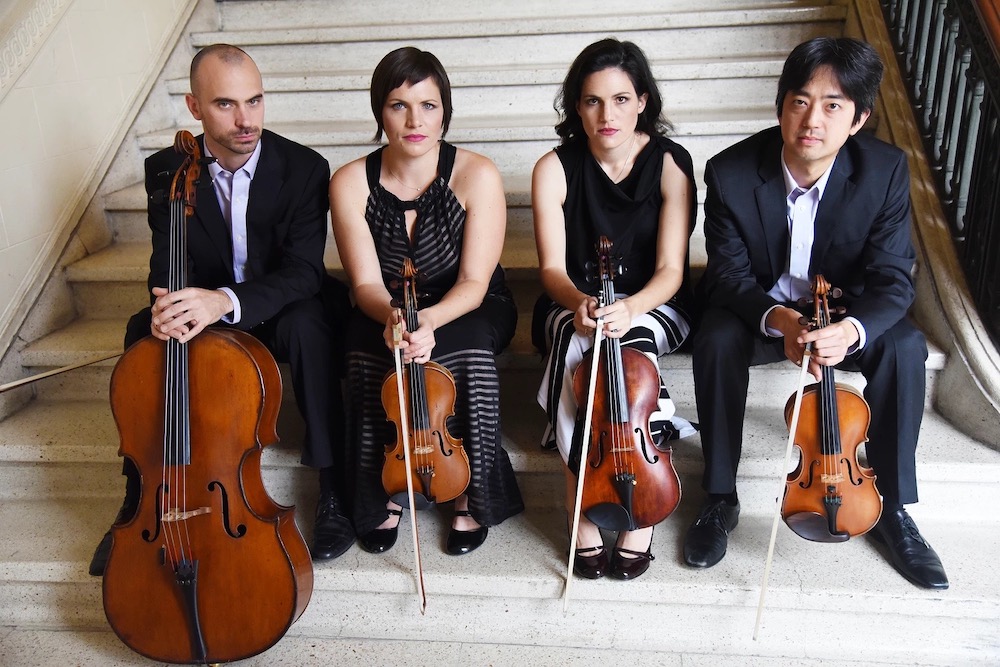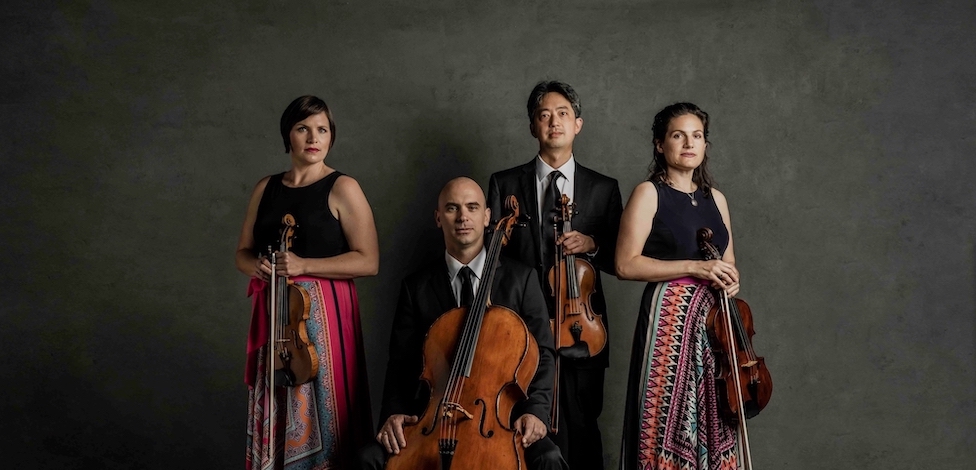It’s a chilly October evening, but the ambiance is warm and inviting within the confines of the tan-and-brown-shaded Foellinger Great Hall in Krannert Center for the Performing Arts in Urbana.
The stage is stark and spacious with wood flooring. On it are the four members of the Jupiter String Quartet, who are rehearsing approximately one hour before a Saturday-night performance – their season debut. They are sitting in their seats with their instruments and four music stands in front of them. A wireless microphone lies atop a rectangular stand behind the chairs.
The members of the group have been together for two decades and hold the positions of quartet-in-residence and associate clinical professors in the School of Music at the University of Illinois Urbana-Champaign, where they have been for ten years. The chamber music they are rehearsing at the moment is a range of sublime sounds, from soaring to melancholy. The violins fly, the cello provides a foundation, and the viola adds rich texture for both instruments to wade through.
Everything seems to be going swimmingly until Meg Freivogel McDonough, the second violinist with an incredible ear for pitch, halts the music to offer feedback to the first violinist, Nelson Lee, about a portion of the piece they were playing.
“You kind of turn it into a resolution feeling too early,” she tells Nelson.

Photo by Sal Nudo.
Liz Freivogel, the violist and older sister of Meg, chimes in, and the three of them determine where in the song Meg is referring to. The cellist, Daniel McDonough, pops out of his chair and heads stage right, his boots hammering the hardwood floor.
Meg, Nelson, and Liz continue to hash out the tone of Nelson’s part in Daniel’s brief absence. When the cellist returns, he asks, “Is it too fast?” No one answers this question.
Meg, who is married to Daniel, tells Nelson she does not want him to think solely of “projecting” his bits. Nelson agrees. More input is offered, and the musicians continue practicing.
The resumed music is urgent and bracing, a wonderful preview of what’s to come during tonight’s performance, which will feature the work of Charles Ives, Eleanor Alberga, and Felix Mendelssohn. To the untrained ear, what’s being played in rehearsal is spectacular, flawless. To the highly trained ear, however, there are once again kinks to work out.
The music stops. Meg asks Daniel a question and makes a recommendation. Nelson plays his instrument in the background, as if to smother the talk. The quartet resumes, playing the same bit of music they were rehearsing before, this time slower.
After a brief pause the cello kicks in, slow and mournful, with the higher-pitched instruments edging in carefully. It’s a nice moment, but the quartet doesn’t play long. This time it’s Daniel who offers an opinion.
“To me it feels just slightly more casual than it did the other day,” he says.
Meg asks Daniel if he can keep the cello “more in the middle.” Daniel, whose instrument the quartet tunes its sound around, seems put off by the suggestion.
Moments later, Meg tells Daniel and Liz they “need to play more towards each other.”
“Nothing felt too slow out there when I listened to it,” Daniel says, a statement that seems unrelated to Meg’s observation about his coordination with the violist.
Meg and Daniel trade a few more thoughts that feel like a secret language only professional musicians know. When the playing resumes, it’s the same slow, sad-sounding bit. Everyone seems tentatively pleased when they stop. “By the time we get there in the program it’ll feel right,” says Liz.
They restart and the music is more upbeat, but they don’t play long. Everyone gets up to head backstage except for Daniel, who will strum on the cello solo for around fifteen minutes, practicing parts for the show and listening to the sound of his instrument in the empty hall.
Approximately 300 people are in attendance when the performance gets underway, most of them in the middle seats with some folks scattered along the edges and perched in the balcony.

Photo by Sal Nudo.
The quartet strives to select pieces that offer audiences a variety of styles and time periods. The music by Ives begins with no prior chit-chat. This is the first time the Jupiters have attempted to play all four songs in the artist’s mostly upbeat “String Quartet No. 1” movement.
Fingers vibrate and bows streak fluidly across strings, or in fits and starts, depending on the music, as the musicians do their thing. All four play with passion and intensity, but there are differences.
Nelson, with his mop of dark hair, has a looseness to his body, a litheness that makes him seem like an extension of his instrument and accompanying bow.
Meg, who comes across as the anchor of the quartet, shows the widest range of emotions, often smiling and looking at her fellow musicians. Liz has a furrowed look to her brow, perhaps a frown at times, as she absorbs the music.
Daniel has a permanent intensity that shows on his face and in his playing. He often taps his foot on the ground loud enough to be heard in the front rows. Whereas Nelson and Meg come off as open-personality players, Daniel and Liz have a more mysterious, solemn vibe.
The Jupiter String Quartet formed when Liz was attending Oberlin College & Conservatory as an undergraduate and the others were studying at the Cleveland Institute of Music. Three of the four members made their way to Boston, all except Daniel, who attended graduate school in New York. For a time, the budding quartet would rehearse in both New York and Boston.
Boston eventually became home base, and the Jupiters’ reputation as a force in the chamber music world grew as they won competitions in 2004 and won the Young Concert Artists International auditions in New York City in 2005. Prior to their arrival at Illinois in 2012, the quartet were in residence at the Chamber Music Society of Lincoln Center’s Chamber Music Two from 2007 to 2010.
Before playing Alberga’s rhythmically complex “String Quartet No. 2,” Liz grabs the microphone and tells the audience a little about the obscure artist’s history and her wide range of musical endeavors. She calls the second of three string quartets by Alberga “exuberant dissonance” with nary a pause from the main motive in the opening measures. For the quartet, the piece is a lot of fun to play.
“She very cleverly constructs the entire piece around this motive,” Liz informs the audience. “You will hear that she kind of breaks it apart, puts it upside down, speeds it up, has us throw it around in the group in all sorts of different types of conversations. Sometimes it sounds like we’re getting along with each other, sometimes not.” This last line draws laughs from the crowd.
As professors at the university, the Jupiters teach chamber music and their instruments to undergraduate and graduate students. They also visit local schools and institutions all over the country to play music and share their love of chamber music to fresh audiences.

Photo by Sarah Gardner.
In mid-October, the quartet will travel to California to visit a middle school and perform at Carmel-by-the-Sea. Closer to home, the Jupiters recently visited Leal Elementary School and will work later in the semester with students at Urbana High School who play string instruments.
Luke Brann studies violin performance and chemical engineering at Illinois, learning his instrument under the guidance of Nelson Lee from the Jupiters. The sophomore was at the Krannert show and said he looks forward to his once-a-week lessons with the violinist more than he does the weekend.
“He provokes me to think for myself while offering the guidelines for what I should be aiming for,” Brann said. “It’s a good balance of letting me decide while giving good guidance for big ideas.”
The audience members clap enthusiastically and stand to show their appreciation at the end of Mendelssohn’s “Finale: Allegro molto,” an emotionally intense piece that concludes the performance. The quartet doesn’t play encore music, but the musicians do leave the stage and return a few times to bow to the audience and demonstrate their appreciation right back.
The Jupiter String Quartet has played extraordinary venues worldwide and earned prestigious awards. But there is something special for them about playing at Krannert, where they can look out into the audience and see neighbors they live by, students they teach, and colleagues they teach with. All kinds of people they know, really.
Nelson, Meg, Liz, and Daniel will likely listen to the recording of the Krannert performance at some point to hear what could be improved upon, but that will happen at a later time. Tonight, they give each other hugs, tell each other “good job,” and go out for celebratory drinks.








